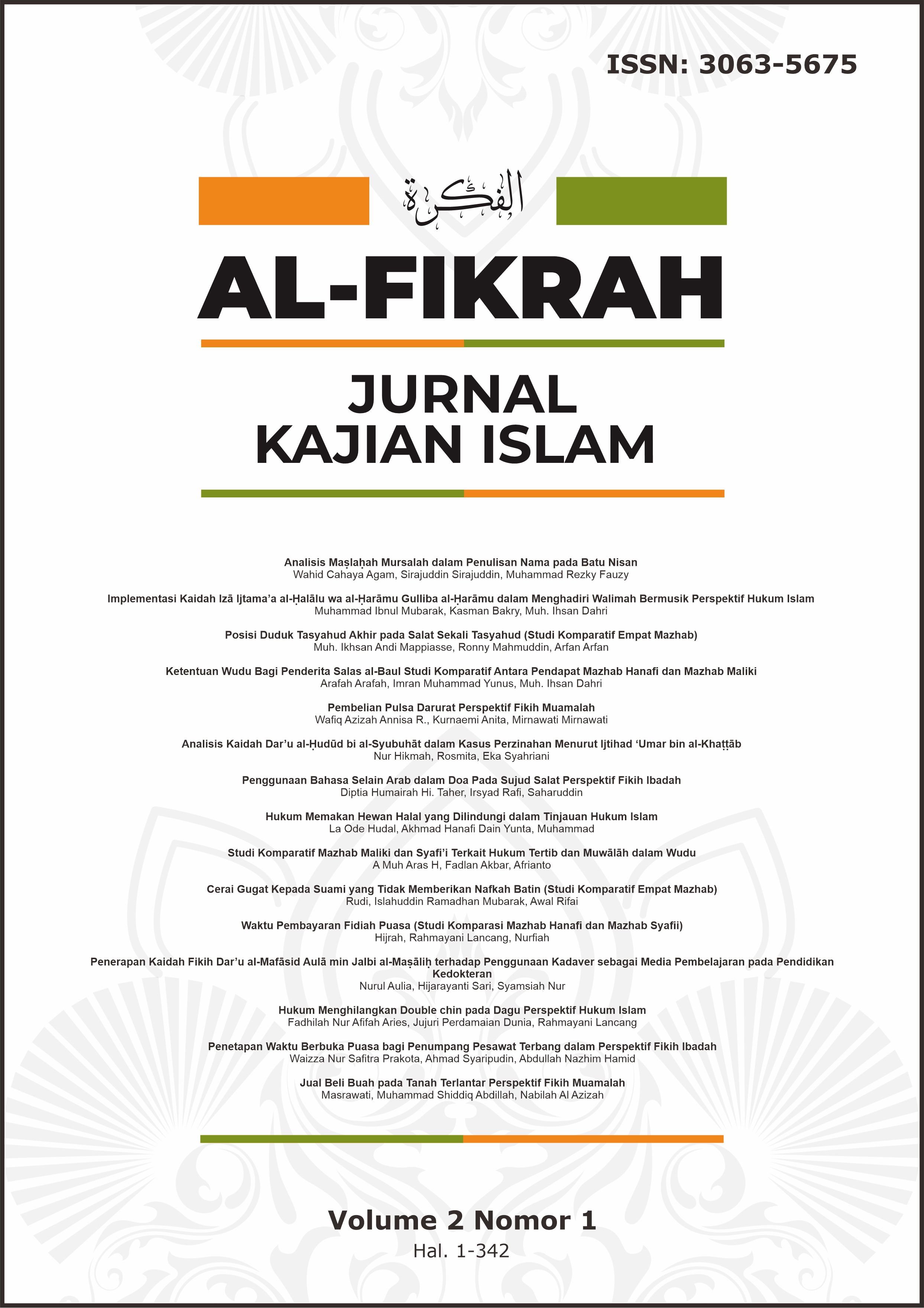Implementasi Kaidah Izā Ijtama’a al-Ḥalālu wa al-Ḥarāmu Gulliba al-Ḥarāmu dalam Menghadiri Walimah Bermusik Perspektif Hukum Islam
The Implementation of Izā Ijtama’a al-Ḥalālu wa al-Ḥarāmu Gulliba al-Ḥarāmu Principle in Attending Music-filled Walimah from Islamic Law Perspective
DOI:
https://doi.org/10.36701/fikrah.v2i1.2351Keywords:
implementation, principle, Izā Ijtama’a al-Ḥalālu wa al-Ḥarāmu Gulliba al-Ḥarāmu, walimah, music-filledAbstract
This research seeks to explore the Islamic perspective on the concept of walimah al-‘urs and the use of music within it, as well as to analyze the ruling on attending musical walimah events through the lens of the fiqh principle Izā Ijtama‘a al-Ḥalālu wa al-Ḥarāmu Ghuliba al-Ḥarām. The study employs a qualitative descriptive approach with a library-based method of data collection. The analysis is conducted using normative juridical methods, complemented by a conceptual framework. Data analysis is done qualitatively with the deductive method. The results show that the law of fulfilling walimah or wedding invitations is obligatory with several requirements. The prohibition of listening to music and playing musical instruments is supported by the aforementioned evidences. The law of fulfilling an invitation to a musical walimah is obligatory if the invitee is able to change the evil contained in the walimah, in this case music. However, if the invitee is unable to change the evil contained in the walimah, then the law is haram based on the rule of Izā Ijtama'a al-Ḥalālu wa al-Ḥarāmu Gulliba al-Ḥarāmu. This research is important as a guide for the community in dealing with the phenomenon of walimah involving music. By understanding the rules and Islamic law that apply regarding the issue of attending a musical walimah, people can make wiser decisions when faced with these problems.
Downloads
References
Buku:
Al-Anṣārī, Abū al-Faḍl Ibnu Manẓūr. Lisān al-Arab. Juz 2. Cet. III. Beirut: Dār Ṣādir, 1414 H/1994 M.
Āli Burnū, Muḥammad Ṣidqī ibn Aḥmad ibn Muḥammad. Al-Wajīz fī Īḍāḥ Qawā'id al-Fiqh al-Kulliyah. Cet. V. Beirut: Muassasah al-Risālah, 1422 H/2002 M.
-------. Al-Wajīz fī Īḍāḥ Qawā'id al-Fiqh al-Kulliyah. Cet. V. Beirut: Muassasah al-Risālah, 1422 H/2002 M.
‘Alī ibn Muḥammad ibn ‘Alī al-Zain al-Syarīf al-Jarjānī. Kitāb al-Ta’rīfāt. Cet. I; Beirut: Dār al-Kutub al-‘Ilmiyah, 1403 H/1983 M.
Al-Bagdādī, Abū ‘Ubaid al-Qāsim ibn Sallām ibn ‘Abdillāh al-Harwī. Garīb al-Ḥadīṡ. Juz 3. Cet. I. Hyderabad Deccan: Maṭba’ah Dāirah al-Ma’ārif al-‘Uṡmāniyyah, 1384 H/1964 M.
Al-Fauzān, Ṣāliḥ ibn Fauzān ibn ‘Abdillāh. Al-Mulakhkhaṣ al-Fiqhī. Cet. I. Riyāḍ: Dār Āṣimah li al-Nasyr wa al-Tauḍīḥ, 1423 H/2002 M.
Al-Haitāmī, Abū al-‘Abbās Aḥmad bin ‘Alī bin Ḥajar. Al-Zawājir ‘an Iqtirāf al-Kabāir. Juz 2. Cet. I. Damaskus: Dār al-Fikr, 1407 H/1987 M.
ibn Katṡīr, Abū al-Fidā Ismāīl ibn ‘Amr. Tafsīr al-Qur’an al-Aẓīm. Juz 6. Cet. I. Su’ūdīyah: Dār ibn al-Jauzī, 1431 H/2010 M.
ibn Qudāmah, Abū Muḥammad ‘Abdullāh ibn Aḥmad ibn Muḥammad. Al-Mugnī. Juz 7. Cet. I. Kairo: Maktabah al-Qāhirah, 1388 H/1968 M.
ibn Taimiyyah, Syaikh al-Islām Aḥmad. Majmū’ al-Fatāwā. Juz 11. Cet. I. Madīnah: Mujamma’ al-Malik Fahd, 1425 H/2004 M.
Kementerian Urusan Islam Dakwah dan Penyuluhan Arab Saudi. Al-Fiqh al-Muyassar fī Ḍau’i al-Kitāb wa al-Sunnah. Cet. I. Madīnah: Mujamma’ al-Malik Fahd li Ṭibā’ah al-Muṣḥaf al-Syarīf, 1425 H/2004 M.
Al-Maqdisī, Ḍiyāuddīn. Ittibā’u al-Sunan wa Ijtinābu al-Bida’. Cet. I. Beirut: Dār Ibnu Kaṡīr, 1407 H/1987 M.
Al-Mardāwī, Abū al-Ḥasan ‘Alī ibn Sulaimān ibn Aḥmad. Al-Inṣāf fī Ma’rifah al-Rājiḥ min al-Khilāf. Juz 21. Cet. I. Kairo: Jumhūriyah Miṣr al-‘Arabiyah, 1415 H/1990 M.
Al-Naisābūrī, Abū al-Ḥusain Muslim ibn al-Ḥajjāj ibn Muslim. Ṣaḥīḥ Muslim. Cet. I. Riyāḍ: Dār Ṭaibah, 1427 H/2006 M.
Al-Nawawī, Abū Zakariyā Yaḥyā ibn Syaraf. Rauḍah al-Ṭālibīn. Juz 11. Cet. III. Beirut: Maktab al-Islāmī, 1412 H/1991 M.
Al-Qurṭubī, Abū al-‘Abbās. al-Jāmi’ li Aḥkāmi al-Qur’ān. Juz 14. Cet. II. Kairo: Dār al-Kitāb al-Miṣriyyah, 1384 H/1964 M.
-------. Al-Mufhim Limā Asykala Min Talkhīs Kitābi Muslim. Juz 2. Cet. I. Beirut: Dār Ibnu Kaṡīr, 1417 H/1996 H.
Al-Ṣan’ānī, Muḥammad ibn Ismā’īl. Subul al-Salām al-Mūṣilah ilā Bulūg al-Marām. Juz 8. Cet. III. Arab Saudi: Dār ibn al-Jauzī, 1433 H/2011 M.
Al-Syāfi’ī, Abū ‘Abdillāh Muḥammad bin Idrīs. Al-Umm. Juz 4. Cet. II. Beirut: Dār al-Fikr, 1410 H/1990 M.
Al-Zuḥailī, Muḥammad Muṣtafā. Al-Qawā’id al-Fiqhiyyah wa Taṭbīqātuhā fī al-Mazāhib al-Arba’ah. Juz 2. Cet. I. Damaskus: Dār al-Fikr, 1427 H/2006 M.
Zainuddīn ‘Abdurraḥmān ibn Aḥmad ibn Rajab ibn al-Ḥasan al-Ḥanbalī. Fatḥul Bārī: Syarḥ Ṣaḥīḥ al-Bukhārī. Juz 8. Cet. I. Madinah: Maktabah al-Gurabā’ al-Aṡariyyah, 1417 H/1996 M.
Jurnal Ilmiah:
Kasman Bakry, dkk. "Pernikahan Wanita Hamil karena Perzinahan (Studi Perbandingan Antara Madzhab al-Arba’ah dan Kompilasi Hukum Islam)". DIRASAH: Jurnal Kajian Islam, 1(1), 2024, h. 40.
Disertasi, Tesis, dan Skripsi:
Moh, Rozaqul Hakim. "Menghadiri Walimah Al-Urs Yang Di Dalamnya Terdapat Musik Electone Perspektif Ulama Madzhab Syafi’iyah (Studi Kasus Desa Doko Kec. Ngasem Kab. Kediri)", Tesis. Kediri: Fak. Syariyah IAIN Kediri, 2022.
Downloads
Published
Issue
Section
License
Copyright (c) 2025 Muhammad Ibnul Mubarak, Kasman Bakry, Muh. Ihsan Dahri

This work is licensed under a Creative Commons Attribution-NonCommercial-ShareAlike 4.0 International License.










